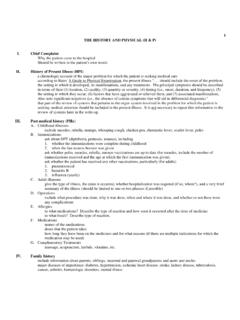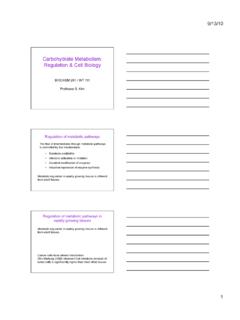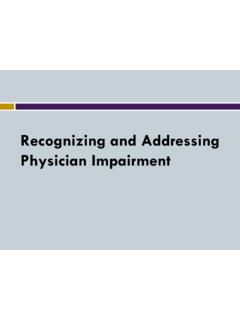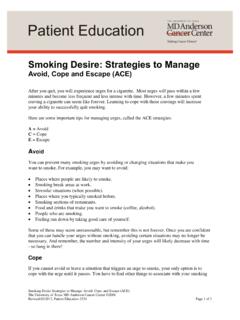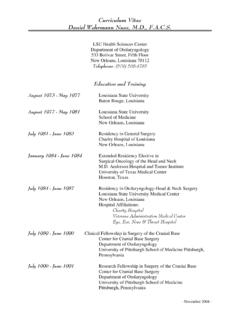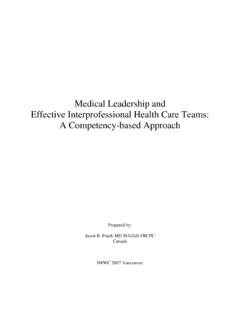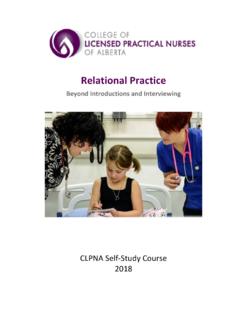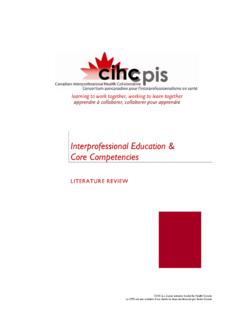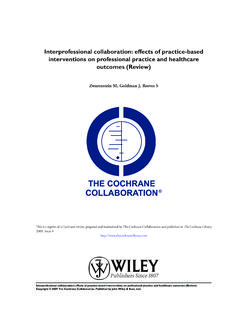Transcription of OBJECTIVES OF THE 3rd YEAR PEDIATRIC CLERKSHIP
1 OBJECTIVES OF THE 3rd year PEDIATRIC CLERKSHIP The pediatrics CLERKSHIP at LSU adheres to the national curriculum as developed by COMSEP (Council on Medical Students Education in Pediatrics). This curriculum addresses issues unique to childhood and adolescence by focusing on human developmental biology, and by emphasizing the impact of family, community and society on child health and wellbeing. Additionally, the CLERKSHIP focuses on the impact of disease and its treatment on the developing human, and emphasizes growth and development, principles of health supervision and recognition of common health problems. The role of the pediatrician in prevention of disease and injury and the importance of collaboration between the pediatrician and other health professionals is stressed. The course OBJECTIVES , outlined below, are linked to the LSU School of Medicine Educational Program OBJECTIVES , which demonstrates the contribution of the pediatrics CLERKSHIP to your overall education.
2 As one of the core clerkships during the third year of medical school, pediatrics shares with family medicine, internal medicine, obstetrics/gynecology, psychiatry, and surgery the common responsibility to teach the knowledge, skills and attitudes basic to the development of a competent general physician. Patient care Students must be able to take age-appropriate medical histories that include the birth, developmental, family and social history (EPO1) Students must be able to perform an age appropriate physical examination that include growth chart and developmental exams (EPO1) Students should demonstrate clinical problem solving by developing a complete problem list and differential diagnosis for each patient (EPO2) Students must formulate an initial diagnostic and therapeutic plan and interpret clinical and laboratory data for each patient (EPO2) Students must learn about immunizations and practice preventive Pediatrics (EPO3) Students must provide effective patient care with respect to patient diversity and cultural beliefs (EPO4) Students must manage unique or challenging aspects of patients health including learning about compassionate end-of-life care (EPO5)
3 Students must demonstrate effective communication in their patient care: (EPO6) o Write a complete history and physical exam o Write daily progress notes o Write admission and discharge orders o Write prescriptions Present a well-organized summary of findings from the history and physical obtained in a patient encounter (EPO6, EPO18) Medical Knowledge Students must acquire knowledge of basic disease processed encountered in pediatrics: (EPO7, EPO8, EPO10, EPO11, EPO12) Issues unique to the newborn infant Issues unique to the adolescent patient Growth and development Infant feeding and childhood nutrition Immunizations and preventive Pediatrics Genetic factors in health and disease Common PEDIATRIC illnesses Therapeutics Fluid and electrolyte management Poisonings PEDIATRIC emergencies Child abuse Identify and apply principles of medical ethics and attributes of professionalism in Pediatrics (EPO9) Practice Based Learning and Improvement Students must use PEDIATRIC literature to research diagnosis and management of clinical problems (EPO13, EPO14) Students must use feedback to implement changes in performance and improvements in practice (EPO15) Interpersonal Relationships and Communication (Program OBJECTIVES 16-18)
4 Student must communicate effectively with patients, families, and other health care workers (EPO16) Students must learn how to communicate effectively with patients in challenging situations (EPO17) Students must communicate effectively with team members (EPO18) Professional Behavior (Program OBJECTIVES 19-21) Students must continue to develop attitudes and professional behaviors appropriate for clinical practice (EPO19, EPO20, EPO21) Students must participate regularly in learning activities that maintain and advance competence and performance (EPO19, EPO20) Attend simulation sessions, student forums, resident conferences and Grand Rounds Systems Based Practice (Program OBJECTIVES 22, 23) Students must continue to learn about the healthcare system including utilization of resources and recognizing how patient care decisions affect the system (EPO22, EPO23) Interprofessional Collaboration (Program OBJECTIVES 24, 25) Learn how to work in a collaborative team with other health professionals and provide care that is safe, effective and efficient (EPO24, EPO25) Personal and Professional Development (Program OBJECTIVES 26, 27,28) Students assess their learning needs, knowledge, emotional needs, and the limitation of their skills, to improve communication with PEDIATRIC patients.
5 (EPO26) Students should demonstrate appropriate help seeking behavior when it is necessary for their well-being or the well-being of their PEDIATRIC patients. (EPO26) Students demonstrate flexibility, maturity, and the ability to utilize appropriate resources in the face of uncertainty. (EPO27) Students should engage in activities that promote personal and professional growth during their PEDIATRIC clerkships (EPO28)
